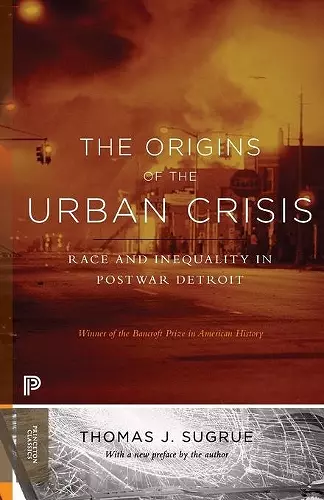The Origins of the Urban Crisis
Race and Inequality in Postwar Detroit - Updated Edition
Format:Paperback
Publisher:Princeton University Press
Published:16th May '14
Currently unavailable, and unfortunately no date known when it will be back

This insightful book explores the historical roots of urban poverty in America, particularly focusing on Detroit's decline and the systemic issues that contributed to it.
In The Origins of the Urban Crisis, Thomas Sugrue offers a profound examination of Detroit, a city once celebrated as America's 'arsenal of democracy,' now emblematic of the urban crisis that plagues many industrial cities. Sugrue delves into the intricate tapestry of racial and economic inequalities that have led to persistent poverty in urban America. He challenges the prevailing narrative that attributes urban decline to the social upheavals and racial tensions of the 1960s, instead tracing the roots of these issues to a deeper, more complex history.
The author meticulously weaves together the histories of various entities, including workplaces, unions, civil rights organizations, political groups, and real estate agencies, to illustrate how systemic racism and economic shifts have reshaped the American urban landscape since World War II. Sugrue highlights the often-overlooked legacy of racial violence and discrimination that has significantly contributed to the socio-economic struggles faced by cities like Detroit.
This Princeton Classics edition of The Origins of the Urban Crisis features a new preface by Sugrue, where he reflects on the lasting consequences of postwar transformations in urban America. He discusses the chronic challenges that ultimately led to Detroit's bankruptcy, emphasizing the urgent need to address the historical injustices that continue to affect the urban environment today.
Winner of the 1998 Bancroft Prize in American History Winner of the 1997 Philip Taft Prize in Labor History Winner of the 1996 President's Book Award, Social Science History Association Winner of the 1997 Best Book in North American Urban History Award, Urban History Association One of Choice's Outstanding Academic Titles for 1997 Praise for Princeton's previous edition:"[Sugrue's] disciplined historical engagement with a complex, often inglorious, past offers a compelling model for understanding how race and the Rust Belt converged to create the current impasse."--America Praise for Princeton's previous edition: "A splendid book that does no less than transform our understanding of United States history after 1940."--Labor History Praise for Princeton's previous edition: "[A] first-rate account ... With insight and elegance, Sugrue describes the street-by-street warfare to maintain housing values against the perceived encroachment of blacks trying desperately to escape the underbuilt and overcrowded slums."--Choice Praise for Princeton's previous edition: "Perhaps by offering a clearer picture of how the urban crisis began, Sugrue brings us a bit closer to finding a way to end it."--In These Times Praise for Princeton's previous edition: "[T]he most interesting, informative, and provocative book on modern Detroit."--Detroit Free Press Praise for Princeton's previous edition: "Superbly researched and engagingly written."--Reviews in American History Praise for Princeton's previous edition: "[A] devastating critique of the currently fashionable 'culture of poverty' thesis. Must reading for anyone concerned about the current urban crisis."--Jacqueline Jones, Lingua Franca
- Winner of Bancroft Prizes 1998
- Winner of Urban History Association Best Book in North American Urban History Category 1997
- Winner of Social Science History Association President's Book Award 1996
- Short-listed for Choice Magazine Outstanding Reference/Academic Book Award 1997
ISBN: 9780691162553
Dimensions: unknown
Weight: 369g
432 pages
Updated Edition